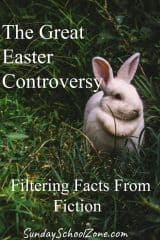The Great Easter Controversy!
 You know that Easter is one of the top two events in the year for Christians. Both Easter and Christmas carry important truths about God’s love and plan that kids need to learn. The problem for many Christian parents and teachers is the culturalization of the holidays. Is Easter still about Jesus’ resurrection? Too often it isn’t. Too often it is more about candy, Easter egg hunts, and bunnies. Like Christmas, the emphasis on what Jesus did (at Easter) or who He was (at Christmas) gets replaced with other symbols and messages that have nothing to do with Jesus. So, how do we go about balancing truth with fantasy at Easter?
You know that Easter is one of the top two events in the year for Christians. Both Easter and Christmas carry important truths about God’s love and plan that kids need to learn. The problem for many Christian parents and teachers is the culturalization of the holidays. Is Easter still about Jesus’ resurrection? Too often it isn’t. Too often it is more about candy, Easter egg hunts, and bunnies. Like Christmas, the emphasis on what Jesus did (at Easter) or who He was (at Christmas) gets replaced with other symbols and messages that have nothing to do with Jesus. So, how do we go about balancing truth with fantasy at Easter?
Balancing Truth and Fantasy
In our family we have always tried to make sure that our kids understood the biblical truths and allowed some room for childhood fantasy. The tricky part is when we attribute God-like characteristics to the fantasy characters. When this happens, children can become confused about what is truth and what is not. The great challenge is when children get older and discover that many of the stories told them in childhood were fictional, then they may wonder, “What about the Bible stories?”
So what do we do for Easter? What can children understand? First, we must realize that the biblical story of Jesus’ life, death, and resurrection was just as God had planned from the beginning. Young preschoolers do not fully understand the reality and finality of death. So we can help them understand that Jesus loved and cared for the people of His day, and is still alive in heaven and loves and cares for us.
As they grow older and have more life experience and understand more about life and death, they can grasp the significance of Jesus’ death and resurrection. These truths are the heart of our faith. We cannot allow the significance of these events to be diluted or confused in the mind of a child or an adult.
My advice? Try to keep the elements of biblical truth and children’s fantasy stories as far apart as possible. Limit or eliminate fantasy at church. At home, separate Bible story time and fantasy story time. Don’t give the fantasy characters God-like qualities.
Bottom line: Don’t be afraid to have fun with your children. Reading to them and challenging their imaginations from early days are keys to intellectual development and creativity as they mature. But maintain the distinction between biblical truth and storybook characters. Enjoy hiding and finding eggs if you wish, but make sure that the moving story of Jesus’ last days on earth are depicted as true, and that God’s power to overcome the physical limitations of life and death are real. I hope these insights will help you with balancing truth with fantasy at Easter.
David Morrow
Pastor, Educator, Children’s Minister
Hendersonville, Tennessee



